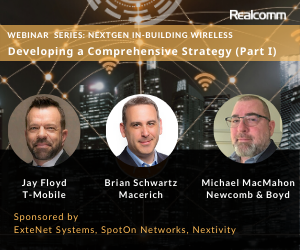Trust-as-a-Service: Looking Externally to Improve Digital Capabilities and Reduce Operating Expenses

In 2020 and 2021, companies have needed to quickly retool their business strategies to flexibly manage the rapid social and economic changes brought on by COVID-19. At the same time, some have struggled to prepare for future disruption without adequate visibility into the current crisis.
As businesses, employees and surrounding communities learn to unlearn what life, work and play will be, the real estate industry also will need to embark on a significant journey. While all of these stakeholders work together to make our buildings healthy and safe, real estate businesses must also revisit the rapid implementation of remote-work programs and assess the continued effectiveness of the people, processes, and technology currently in place.
The confluence of digital transformation and COVID-19 has created a multitude of new demands for digital services, from digital building amenities to real-time reporting on business data. In a study of 1,000 global IT professionals conducted last year, nearly two-thirds (65%) reported that in the first few months of the pandemic they had already launched digital transformation initiatives that were previously deemed unnecessary. These digitization efforts are likely to accelerate.
At the same time, the pandemic cratered revenues for many companies across many industries, leaving them no choice but to do more with less. That has not been easy, considering widespread staff reductions as employees have been let go or forced to exit and remain absent from the workforce to care for families.
As businesses work to meet these rising demands with reduced workforces, a solution that can be effective is freeing up in-house resources by turning to outsourced or managed services for tasks that are not mission-critical or core functions. Outsourcing provides individual services for specific business processes or tasks with a goal of saving money on labor costs and overhead; managed services provide deeply skilled teams that remotely manage an entire function, such as accounting, and offer operational support across IT and business domains.
Business performance is typically defined by empirical metrics like operational KPIs, revenues and profits, and customer satisfaction. But today, as these disruptions have spurred organizations to turn to these external resources, business success hinges on a more emotional and subjective factor: trust.
Organizations must have confidence that their systems, networks, services, employees, and third-party relationships will deliver the expected outcomes on a reliable basis. And as more companies outsource more tasks and functions, they must be confident that their third-party providers will securely deliver services that contribute to business efficiencies and growth.
Commoditizing trust
Conventionally, we have thought about trust in the context of human relationships. Not anymore. In today’s digital ecosystem, trust is critical to a company’s integrity, reputation, and, ultimately, long-term success.
The personal nature of trust may seem incongruous in the context of business performance. So let’s talk about trust using a familiar human analogy: How we keep our children – our most valuable assets – safe and healthy. Those with young children may hire a nanny to provide at-home care. This mirrors managed services in that the nanny performs operational tasks that stretch beyond childcare, such as light housecleaning, cooking and trips to the playground. Other parents may opt to send preschoolers to a childcare facility where they receive a more limited, less personalized range of services away from home. That’s outsourcing.
Both options require tremendous trust. Parents must be confident that nannies and childcare workers understand and adhere to family and cultural values. They expect that these essential workers will responsibly follow established ground rules and make prudent decisions when the unexpected occurs. Caretakers, in other words, should act as an extension of the family in how they think about parenting.
It’s not all that different in the business world. Organizations need to foster trusting relationships with employees, business partners, and third parties to ensure that they embrace company values and dynamics. Just as a childcare worker’s overarching responsibility is keeping their charges safe from harm, businesses rely on people to provide the underlying technologies and processes that drive real-time insights, boost productivity, and keep the company secure. Doing business today demands that companies have the right technologies, processes and people skills, including:
- Using data to improve results, efficiency and profitability
- Managing IT, cyber, compliance, privacy, and operational risks, especially as companies continue to navigate remote work environments
- Optimizing the effectiveness of business departments, functions and reporting
These capabilities are evolving as the concept of trust moves from humankind to machine as the Internet of Things (IoT) becomes the Internet of Everything (IoE). Billions of devices are connected to these networks and can share data and make decisions without human assistance.
Moving toward managed services and outsourcing
Managed services and outsourcing are nothing new, of course; they have been around in some form for decades. Procurement from external sources can include commoditized services like accounting services or basic IT tasks such as data entry, as well as specialized services like artificial intelligence. And the variety of managed services has ballooned in recent years to encompass Anything-as-a-Service, or XaaS. XaaS can deliver an array of sophisticated offerings such as project management, risk management, application support, internal audit, budgeting and forecasting, and data insights, to name a few.
The as-a-service delivery model’s value is that providers offer specialized technologies and solutions that many companies simply cannot duplicate in-house. What’s more, managed services can be more efficient and cost-effective than on-premise capabilities – even for standard business functions like accounting.
Outsourcing to third-party managed service providers can be truly transformational – and disruptive. Consider the impact of high-tech ride-hailing companies on Transportation-as-a-Service. These businesses have revolutionized public transportation of people, food and freight by rewriting the rules regarding:
- Business model: A new on-demand model with millions of gig workers
- Equipment: Virtual fleets have replaced individual automobiles
- Technology: Easy-to-use, reliable solutions for the back office and the back seat
- People: Outsourced drivers/employees
- Data: Data-rich mobile services have replaced conventional communications like voice calls
Given these services’ phenomenal ascent, it’s likely that companies within this sector will outsource transportation not just of people and food but also last-mile delivery of most everything that requires handoff by a human.
Identify the right managed services
Before you begin considering what managed services options fit your needs, initiate a discussion about trust. Stakeholders should agree on what tasks or functions they are confident that third parties can perform as well as or better than they can. Also, consider stakeholder confidence in your organization’s ability to perform certain tasks in-house. Customer trust that you will protect their personal data is another critical factor.
Determining what applications and data should be entrusted to a managed services provider will require a thorough understanding of existing applications and capabilities. Business leaders should assess all functions and applications to gauge performance and efficacy.
It’s critical to determine if you have people with the right skills for major functions and which areas might be candidates for managed services. Champion managed services to help your employees avoid tedious tasks and focus on innovation, which can empower them to grow their professional skills and increase personal fulfillment and job satisfaction.
Finally, make sure that you understand the potential issues that can arise from allowing a service provider’s staff to perform a particular task or function on-premises. Weigh whether you are comfortable introducing that risk in exchange for that service, and, if so, be sure to choose a team that you are confident will be a good fit for your culture and people and will act as an extension of your team and organization.
Trust can be taken for granted – until it is broken
When we talk about “trust-as-a-service,” we’re talking about an intangible service – not so much a specific offering but rather a general trust that expectations will be met, and that stakeholders can make informed decisions based on that expectation.
Consider mobile payment services like Venmo, Zelle or others. Consumers don’t need – or want – to know the technical details of how they work. They care only that these services do work as expected when they need to split a restaurant bill or a baby-shower gift. In other words, consumers trust that the applications will make the payment – the expected outcome – as promised.
This kind of trust is so ingrained that we rarely think about it. The people and things we trust the most are often unseen or unnoticed. How often have you questioned the following?
- Trust that your money is safe in the bank.
- Trust that your automobile brakes will work.
- Trust that your electricity will continually power your home.
Chances are, you don’t doubt these services – until they don’t work. Consider, for instance, the recent Texas power grid failure. In February, a powerful winter storm knocked out the state’s independent electric grid, leaving millions of Texans without power and heat during an arctic weather blast. The outage lasted for days and resulted in dozens of deaths, and electric customers received little information on the blackout, leaving them literally in the dark. It’s doubtful that those impacted will have the same reflexive confidence in electricity when they flip a switch in the future.
In trust we trust
Simply put, trust is the glue that binds society, community, the economy, critical infrastructure, business, and government. In today’s digital ecosystem, trust has become a critical business asset that’s essential to long-term success and growth. Trust builds stakeholder confidence and customer loyalty, and that’s essential to raising future revenues. For business functions such as IT or finance, trust means that someone will be available to confidently provide guidance when things go wrong.
We believe that trust is a process journey – one that your service providers should take with you, hand in hand, to serve as a trusted advisor across functions. A reliable managed services partner can act as an extension of your in-house workforce to help strengthen and grow your business in years to come.
This Week’s Sponsor
CohnReznick have dedicated real estate professionals who help clients manage current business realities while mitigating risk and planning for the future. The firm works with organizations to improve operational and financial processes, implement leading technologies and leverage best practices in process redesign to drive efficiencies and increased profitability.
Read Next
 5/15/2025
5/15/2025
Tech, Talent and Transformation: 2025 Digie Finalists Announced For 27 years, Realcomm has presented the Digie Awards to acknowledge companies, real estate projects, technologies, and individuals that have advanced the commercial real estate industry through the strategic use of technology, automation, and innovation.
 5/15/2025
5/15/2025
Empowering Space Management with Data-Driven Visualization For effective CRE space management, it’s critical to centralize lease data, maximize rental square footage (RSF), improve energy efficiency and reconfigure spaces to meet changing needs.
 5/8/2025
5/8/2025
The AI-Powered Workplace Evolution: Redefining the Business Landscape In today's rapidly evolving business environment, the fusion of Artificial Intelligence (AI) and Workplace Management is revolutionizing the way organizations approach workspace optimization and operational efficiency.
 3/27/2025
3/27/2025
The Convergence of Edge Computing, Cloud, and AI in Building Automation and Smart Buildings In the built environment, we have seen the convergence of Operational Technology (OT) and Information Technology (IT), later expanding to include Workplace Technologies (WP).





%20(1)%20(1)%20(1).png)







